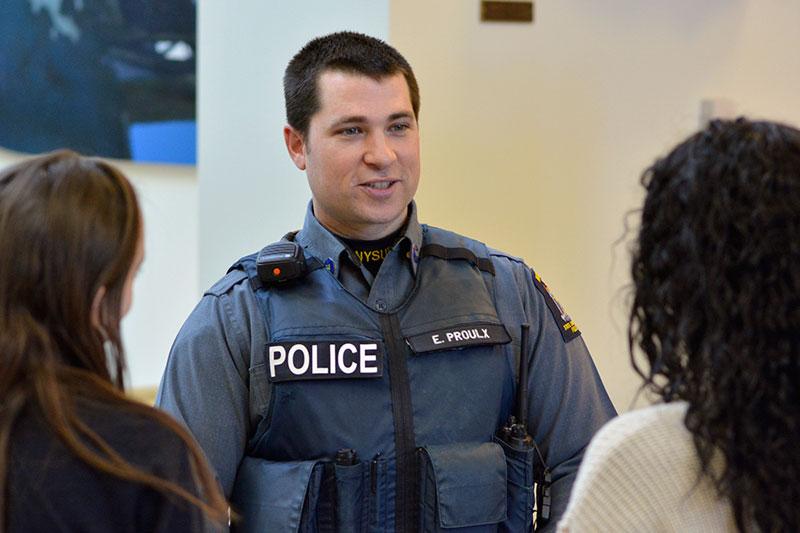Campus outreach—University Police Officer Evan Proulx speaks with SUNY Oswego sophomore Olivia Hawley (left) and freshman Ilany Rodriguez during an informational event March 3 along Marano Campus Center’s concourse. University Police at the college earned state accreditation last week after a months-long effort to demonstrate effective compliance with 133 exacting standards of professionalism, including such proactive policing as community relations.
University Police at SUNY Oswego attained state accreditation recently, an achievement that marks it as one of only 10 departments in the State University system and fewer than 150 police agencies of all kinds statewide to meet scores of exacting standards of professionalism.
The state Law Enforcement Accreditation Council provided formal recognition that University Police meets or exceeds expectations of quality in administration, training and operations. Achieving accreditation requires a department to demonstrate the effectiveness of its policies supporting 133 standards, covering everything from fiscal responsibility to firearms training, treatment of crime victims to evidence handling.
“SUNY Oswego’s University Police Department becomes the 10th within SUNY to be accredited and puts us one step closer to our system-wide goal of attaining state accreditation across our university system,” SUNY University Police Commissioner Paul Berger said. “Chief (John) Rossi as well as the officers and staff at Oswego are much deserving of this recognition, and I commend the entire department for its continued excellence in ensuring the safety and security of the Oswego campus community.”
Assistant Chief Kevin Velzy, program manager for the accreditation effort, began intensively working on the project in October 2014. The effort, he said, resulted in a book-length set of policies and procedures that shows University Police at the college “maintains a high level of professionalism” and that guides the actions of supervisors and officers moving forward.
“We’ve always done things the right way, but putting it into writing to demonstrate you’ve been doing it was the big challenge,” Velzy said. “Overall, it helps make a good agency better. It promotes a feeling of pride that we accomplished these standards.”
Rigorous review
A three-person team of assessors representing the state Office of Public Safety—a retired police chief, an assistant chief at a community college and a large-city police lieutenant—made a January visit to Oswego for three days. Among the team’s goals was to test the knowledge of Oswego’s 21 sworn officers and three full- and part-time dispatchers in complying with the standards.
Evidence handling, police pursuits, drinking-and-driving cases—nothing escaped the attention of the assessors in University Police operations, Velzy said, and the administration and training in the department were no different: psychological screening of recruits, performance evaluations, rules of conduct, firearms use and training, safeguarding agency weapons, managing records and much more.
Standards also cover such proactive policing as community relations, media relations and crime-prevention campaigns. In a signal achievement last year, SUNY Oswego won first place nationally in the National Law Enforcement Challenge, a program that recognizes excellent law enforcement traffic safety programs.
“We’ve been working very hard to expand our community policing efforts,” said Velzy, noting that on March 29, University Police will host a multi-agency event in cooperation with the Governor’s Traffic Safety Committee, this year titled “Drive Safe, Live Safe.”
University Police at SUNY Oswego joins departments at Buffalo State, Cortland, Fredonia, Geneseo and Oneonta among comprehensive colleges earning accreditation, along with the four SUNY university centers. Accredited local law enforcement agencies include the Oswego County Sheriff’s and Oswego City Police departments. The reaccreditation cycle is five years.




